Related Research Articles

Campion Hall is one of the four permanent private halls of the University of Oxford in England. A Catholic hall, it is run by the Society of Jesus and named after Edmund Campion, a martyr and fellow of St John's College, Oxford. The hall is located on Brewer Street, between Christ Church and Pembroke College. The buildings, along with many of the fixtures and fittings, were designed by Sir Edwin Lutyens, his only buildings in Oxford. The hall also houses an extensive collection of religious art spanning 600 years; the pieces were collected primarily by Fr Martin D'Arcy in the 1930s.

Ruskin College, originally known as Ruskin Hall, Oxford, is part of the University of West London, located in Oxford, England. It is not a college of Oxford University. It is named after the essayist, art and social critic John Ruskin (1819–1900) and specialises in providing educational opportunities for adults with few or no qualifications. Degrees taught at Ruskin were awarded by the Open University. The college planned to merge with Activate Learning from July 2021, but instead was acquired by the University of West London during August 2021.

Oxford Brookes University is a public university in Oxford, England. It is a new university, having received university status through the Further and Higher Education Act 1992. The university was named after its first principal, John Henry Brookes, who played a major role in the development of the institution.
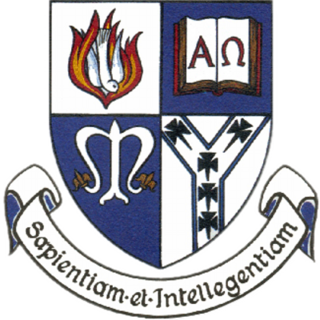
Mater Dei Institute of Education was a linked college of Dublin City University from 1999 until its closure in 2016, located in Drumcondra, Dublin City, Ireland, near Croke Park, on the site of what was formerly Clonliffe College, the Roman Catholic Seminary for the Archdiocese of Dublin. The college was founded by Archbishop John Charles McQuaid in 1966 as an institute for the training and formation for teachers of religion in secondary schools in the Republic of Ireland. Clonliffe was also affiliated to the Angelicum in Rome that offered a three-year course leading to a diploma and a four-year course leading to a Masters; Fr. Joseph Carroll was its first president. Other Presidents of the College included Msgr. Michael Nolan, Dr. Dermot Lane and Sr. Eileen Randles IBVN(1986-1995). The foundation of the college was a response to the challenges posed by the Second Vatican Council. It had a Roman Catholic ethos and had approximately 800 students.

Oxford East is a constituency represented in the House of Commons of the UK Parliament by Anneliese Dodds of the Labour Party, who also serves as party chair.
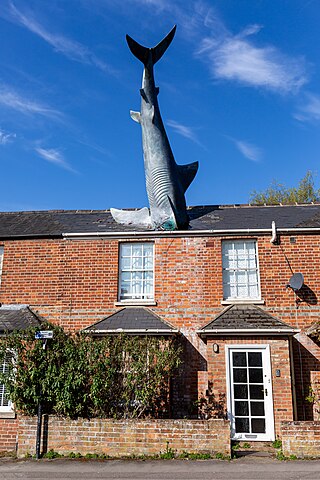
Headington is an eastern suburb of Oxford, in the county of Oxfordshire, England. It is at the top of Headington Hill overlooking the city in the Thames valley below, and bordering Marston to the north-west, Cowley to the south, and Barton and Risinghurst to the east. The life of the large residential area is centred upon London Road, the main road between London and Oxford.

Sir William Markby, KCIE was an English judge and legal writer.
Cheney School is a secondary school and sixth form with academy status, located in Headington, Oxford, England. It serves the Headington and East Oxford area as a destination for students from primary schools across the city. The headteacher has been Rob Pavey since 2020. Cheney School is part of River Learning Trust.

Headington School is an independent girls' school in Headington, Oxford, England, founded by a group of evangelical Christians in 1915.
The Marlborough C of E School is a coeducational Church of England secondary school in the market town of Woodstock, about 8 miles (13 km) northwest of Oxford. The school's catchment area includes Woodstock and surrounding villages. It is named after the Duke of Marlborough whose ancestral home, Blenheim Palace, is in Woodstock.

Boars Hill is a hamlet 3 miles (5 km) southwest of Oxford, straddling the boundary between the civil parishes of Sunningwell and Wootton. It consists of about 360 dwellings spread over an area of nearly two square miles as shown on this map from the long established Boars Hill Association. Historically, it was part of Berkshire until the 1974 boundary changes transferred it to Oxfordshire.
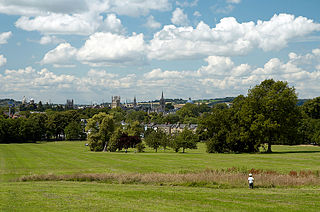
Headington Road is an arterial road in the east of Oxford, England. The road connects the junction of St Clements and Marston Road with the suburb of Headington, up Headington Hill. When it reaches the Headley Way junction, it becomes London Road, as the Boundary Brook runs under the road at this point.

Cotuit Hall is part of the EF International Academy's campus in Oxford, England. Until 2011 it was one of the halls of residence at Oxford Brookes University.
The name Warnborough is associated with several related institutions of higher education existing from 1973 to the present, including Warnborough College Oxford, Warnborough College UK, Warnborough College Ireland and Warnborough University, some of which are no longer in operation. Warnborough College UK provides educational programmes both on-site in Canterbury, England, and by distance learning. Warnborough College Ireland offers distance-learning programmes from Ireland. Warnborough College has been the subject of multiple controversies relating to misrepresentation, education quality, legal and tax troubles, and eligibility to participate in government financial assistance.

The English Martyrs Catholic School and Sixth Form College is a secondary school and sixth form college located in Hartlepool with academy status. English Martyrs is the only Catholic secondary school in Hartlepool. The school and college are both located on the same site on Catcote Road, however, a newly built specialist sixth form block provides the majority of A-Level classes, as well as some 11–16 school lessons.
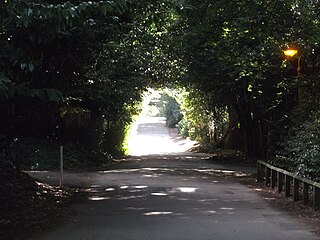
Pullens Lane is in Headington, east Oxford, England. It is located at the top of Headington Hill, leading north off Headington Road to Jack Straw's Lane and Harberton Mead. The cul-de-sac Pullens Field leads off west from Pullens Lane.

The Vines is a house on Pullens Lane, Headington, a suburb in east Oxford, England. It was the first house to be built on the west side of the lane, on land that was originally owned by the Morrell family, local brewers. The house is built of red brick with stone dressings.
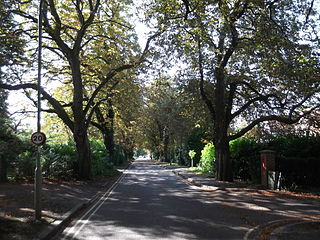
Jack Straw's Lane is a residential road in Oxford, England. It runs between the north end of Pullens Lane on Headington Hill and Marston Road.

Stratford Caldecott was a Catholic author, editor, publisher, and blogger. His work spanned subjects as diverse as literature, education, theology, apologetics, economics, environmental stewardship, sacred geometry, art, and culture. His books include Secret Fire, Radiance of Being, Beauty for Truth's Sake, All Things Made New, and Not as the World Gives. He was a founding editor of the online journal Humanum and a contributor for several online and print journals. He was inspired by the Catholic author J. R. R. Tolkien and became known as a Tolkien scholar.
References
- 1 2 Chiles, Dennis (1996). A Silken Thread: the history of Plater College 1921–1996. Oxford: Plater College.
- ↑ Scotti, Paschal, Out of Due Time: Wilfrid Ward and the Dublin Review . CUA Press, 2006. ISBN 978-0-8132-1427-6. Page 131.
- ↑ Old Oxford Walton Street-Plater College Archived 8 January 2009 at the Wayback Machine , Headington, Oxford, UK.
- ↑ Joseph Kirwin Obituary [ permanent dead link ], Oxford Mail , 31 March 2005.
- ↑ The Pullens/Fairfield Pullens Lane, Headington, Oxford, UK
- ↑ The Chesterton Review Archived 14 February 2006 at the Wayback Machine , Vol XXVIII, Nos 1&2, February/May 2002.
- ↑ Second Spring.
- 1 2 Philpot, Terry , 'No second chance for giver of fresh starts', Times Higher Education , 9 December 2005.
- ↑ The Rules, Standing Orders, and Special Schedules of the Oxford Union Society Archived 20 March 2009 at the Wayback Machine , Oxford Union, UK.
- ↑ The ALI was merged into the Office for Standards in Education, Children's Services and Skills in April 2007.
- ↑ Objectors drop college action, Oxford Mail, 9 November 2005.
- ↑ Little, Reg "Plater College Sells for £5.6m, Oxford Daily Mail 30 June 2006.
- ↑ "Charles Plater Trust Annual Report" UK Charity Commission(March 31, 2008) [ permanent dead link ]
- ↑ Archbishop Nichols hosts Plater awards evening Archived 26 May 2010 at the Wayback Machine , The Catholic Herald , 29 January 2010.